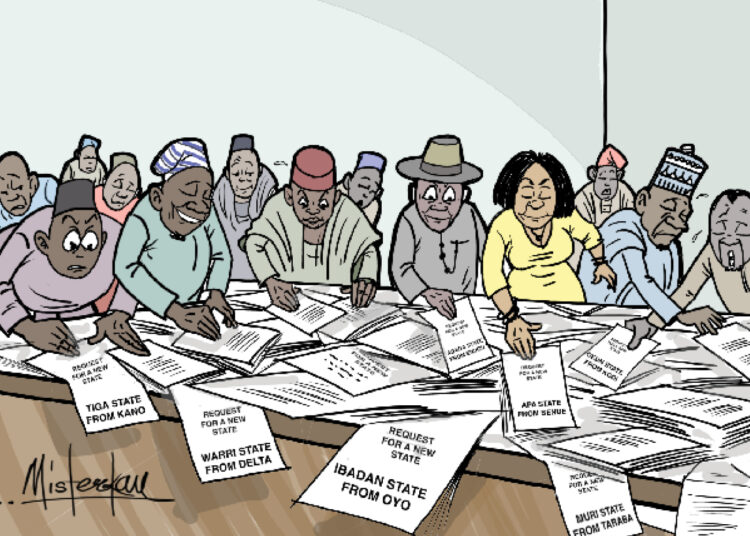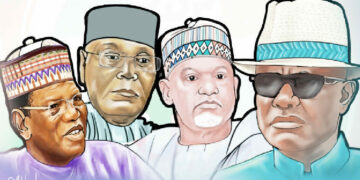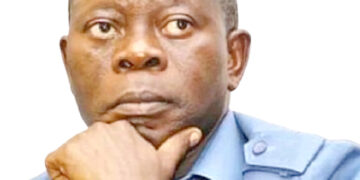Many years ago, when my son was completing paperwork for a job with the Lagos State government, he was required to fill out a form that included his State of Origin. He paused.
It had been marked a compulsory field, and he wanted to know if not filling it would affect his chances. I said it would. He replied that he wouldn’t fill it, even if it meant losing the job. It didn’t make sense to him that his chances might come down solely not to his competence, merit, or the fact that he was born in Lagos where he has resided all his life – but to the state where he is from.
He didn’t fill it and didn’t get the job, though I cannot remember if there were other reasons. Nigeria is the only country I know where a citizen or resident is compulsorily required to fill out their state of origin and local government and provide details of their forbears to the fourth and fifth generation as a basis for getting a job or contract.
In the beginning
It’s mainly a public sector thing – the sector that has been our blessing and bane. In its original form, “state representation,” apart from being a core unit of the federation, was also supposed to be a form of affirmative action. It was supposed to be a tool to encourage fair representation and protection, especially for ethnic minorities. The colonial government laid the foundation with the Sir Henry Willink Commission in 1957 to examine the agitation of minorities on the eve of Nigeria’s independence.
But like all good things politicians touch, they have managed to debase it. It’s convenient to argue that it was not politicians but the military that started it. States have been created five times since former Head of State General Yakubu Gowon created 12 from the four regions in 1967 to weaken Biafra.
But Gowon did it at the behest of politicians, as has every other military leader after him, including military President Ibrahim Babangida, who loved it so much he did it twice.
Growing obsession
Nigeria has since grown from 12 to 36 states. Former Head of State General Sani Abacha delivered the last set of sextuplets of states in 1996. Yet, the urge for more has not only become a national pastime. It is perhaps the next single biggest obsession of politicians after “budget padding”, a practice that permits lawmakers to inflate the annual appropriation bill to gratify themselves.
All 10 National Assemblies since 1999 have never failed to mention and pursue the creation of more states. Committees on state creation have traveled the country at substantial public expense, selling new states as the snake oil to “marginalised” communities.
At the end of such jamborees, including the collection of tonnes of memos that only feed the public a false hope, the politicians leave expectant communities high and dry until the following memo collection by a new set of politicians who lie to themselves that state creation is the medicine for social injustice. Not exactly true.
Not a joking matter
State creation is a serious business. For example, the request for a new state in Nigeria must be supported by at least two-thirds of the representatives from the area, from the councils to the state and National Assembly.
That’s the first step. After that, it must undergo a referendum that must be ratified by a simple majority of all the states in the federation and by a simple majority of members of the National Assembly. Military governments in the country created states without much resistance because of their unitary command and control structure. Even at that, deadly disputes among splintered states lingered and still linger on for years.
The assets-sharing dispute between Kano and Jigawa States lasted 18 years, while the boundary dispute between Cross River and Akwa Ibom continues after 38 years, with many lives lost. The Oyo-Osun post-state creation clashes rank high on the violent dispute ladder, stoking agitation for the creation of the New Oyo State. The case between Bauchi and Plateau remained a low-intensity dispute that later morphed into ethnoreligious clashes.
States abroad
It’s not for nothing that none of the world’s most prominent federations, such as India, the US, Canada, or Brazil, has created a new state in the last 50 years. This is not because of a lack of demand or because these countries have no ethnic minorities who feel endangered. Instead, they are evolving ways of managing their diversity that reduce the salience of statism as a basis for social justice, such as prioritising merit and competence.
Agitation for more states remains a recurring problem in Nigeria because politicians have managed to frame it as perhaps the most viable route to development – the channel connecting neglected communities to Abuja’s drunken sailors.
Many governors have praised state creation not necessarily for the opportunities they have created from the exercise by looking inwards but because of their access to Abuja’s monthly pie. For being a state, however miserably governed, Nigerian states are entitled to 26.72 percent of the monthly revenue from the federation account, which can run into billions of naira. Among politicians, the lust for a share of this pie or monthly allocation is at the heart of the relentless demand for new states.
Making it 67?
The House of Representatives’ bill to create 31 additional states to bring the number to 67 is a joke. As far as demands for new states go, the most rigorous effort in the last 20 years was in 2014, when President Goodluck Jonathan’s government set up the National Conference to discuss mainly structural issues facing the country.
The conference recommended 18 additional states to bring the number to 54. The main arguments were the arbitrariness in previous exercises by the military. In the case of the South East, the point was made that the region has remained maliciously underserved in political representation, making it look like a continuation of Nigeria’s Civil War by other means.
A fundamental difference between the conference’s recommendation and others before and after it is the suggestion for six equipotent zones (with the same number of states), which would form the basis of the federating units with the centre. The conference further recommended that each zone could create more states if it deemed desirable and could finance it.
An unlikely adventure
There was no final agreement. “My experience at the conference,” Chief Ajibola Ogunshola, one of the members representing the South West, wrote in a paper in 2017, “suggests that it is highly unlikely that the establishment of zonal governments now or in the near future can be achieved through voluntary, peaceful negotiations.”
It’s even more unlikely now that the Federal Government is almost broke and only four of the 36 existing states are solvent. A 2023 report by the public sector transparency watchdog, BudgIT, said 32 states relied on Federal Allocation for at least 55 percent of their monthly revenue.
What matters
Are politicians genuinely interested in social justice, inclusiveness and development for their communities? They must look beyond the random creation of new states, quotas, privileges and other forms of affirmative action, often a disincentive to merit, resourcefulness and innovation.
States are not in short supply, yet because of primordial greed, the campaign for more will not abate until each of Nigeria’s 350 ethnic nationalities has one. Politicians know the difference between greed and necessity but will not dare to make the right choice. They earn a living by feeding their communities false hope.





